Connect With Us
Blog
Items filtered by date: May 2023
The Feet and Falling
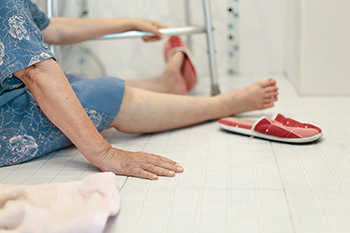
Falls are serious. They are the second cause of unintentional injuries leading to death in the world. They can also cause permanent disability. As might be expected, seniors, especially women, incur the greatest number of falls. Aging people are less steady on their feet, and have other physical, cognitive, and sensory age-related changes that can make falling a more likely occurrence. Falls among those in this population can greatly interfere with mobility, quality of life, and independence. Additionally, many environments are not age friendly. Implementation of effective fall prevention strategies among seniors can save heartache in their limited years. These strategies can include having regular physical and eye examinations which can monitor existing medications and eyeglasses. It can also help to participate in an exercise program to maintain strength and stability, in addition to keeping households and outer doorways well lit. If you are a senior, it is suggested that you visit a podiatrist regularly for examinations and other tips on preventing falls.
Preventing falls among the elderly is very important. If you are older and have fallen or fear that you are prone to falling, consult with one of our podiatrists from Fox Valley Foot and Ankle Specialists. Our doctors will assess your condition and provide you with quality advice and care.
Every 11 seconds, an elderly American is being treated in an emergency room for a fall related injury. Falls are the leading cause of head and hip injuries for those 65 and older. Due to decreases in strength, balance, senses, and lack of awareness, elderly persons are very susceptible to falling. Thankfully, there are a number of things older persons can do to prevent falls.
How to Prevent Falls
Some effective methods that older persons can do to prevent falls include:
- Enrolling in strength and balance exercise program to increase balance and strength
- Periodically having your sight and hearing checked
- Discuss any medications you have with a doctor to see if it increases the risk of falling
- Clearing the house of falling hazards and installing devices like grab bars and railings
- Utilizing a walker or cane
- Wearing shoes that provide good support and cushioning
- Talking to family members about falling and increasing awareness
Falling can be a traumatic and embarrassing experience for elderly persons; this can make them less willing to leave the house, and less willing to talk to someone about their fears of falling. Doing such things, however, will increase the likelihood of tripping or losing one’s balance. Knowing the causes of falling and how to prevent them is the best way to mitigate the risk of serious injury.
If you have any questions, please feel free to contact our office located in Naperville, IL . We offer the newest diagnostic and treatment technologies for all your foot care needs.
Let the Expert Treat Your Ingrown Toenails
Sources of Plantar Fasciitis
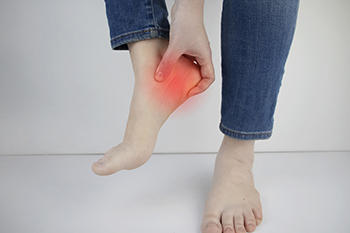
The strong tendon found on the bottom of the foot which connects the heel to the toes is called the plantar fascia. Inflammation or a tear to this tendon can be quite uncomfortable and result in plantar fasciitis. This condition can be caused by frequently running on uneven surfaces or wearing shoes that do not fit correctly. Many people who stand for the majority of the day may develop plantar fasciitis, in addition to pregnant women due to the extra weight their feet must bear. While pregnancy is a temporary condition, obesity may be a more permanent one, and this can put constant pressure on the plantar fascia. Studies suggest that people who have poor circulation may slowly develop plantar fasciitis because of the loss of blood flow to the feet. If you have heel pain, it is strongly suggested that you speak with a podiatrist who can offer you permanent treatment solutions.
Plantar fasciitis is a common foot condition that is often caused by a strain injury. If you are experiencing heel pain or symptoms of plantar fasciitis, contact one of our podiatrists from Fox Valley Foot and Ankle Specialists. Our doctors can provide the care you need to keep you pain-free and on your feet.
What Is Plantar Fasciitis?
Plantar fasciitis is one of the most common causes of heel pain. The plantar fascia is a ligament that connects your heel to the front of your foot. When this ligament becomes inflamed, plantar fasciitis is the result. If you have plantar fasciitis you will have a stabbing pain that usually occurs with your first steps in the morning. As the day progresses and you walk around more, this pain will start to disappear, but it will return after long periods of standing or sitting.
What Causes Plantar Fasciitis?
- Excessive running
- Having high arches in your feet
- Other foot issues such as flat feet
- Pregnancy (due to the sudden weight gain)
- Being on your feet very often
There are some risk factors that may make you more likely to develop plantar fasciitis compared to others. The condition most commonly affects adults between the ages of 40 and 60. It also tends to affect people who are obese because the extra pounds result in extra stress being placed on the plantar fascia.
Prevention
- Take good care of your feet – Wear shoes that have good arch support and heel cushioning.
- Maintain a healthy weight
- If you are a runner, alternate running with other sports that won’t cause heel pain
There are a variety of treatment options available for plantar fasciitis along with the pain that accompanies it. Additionally, physical therapy is a very important component in the treatment process. It is important that you meet with your podiatrist to determine which treatment option is best for you.
If you have any questions, please feel free to contact our office located in Naperville, IL . We offer the newest diagnostic and treatment technologies for all your foot care needs.
Health Problems Caused by Flat Feet
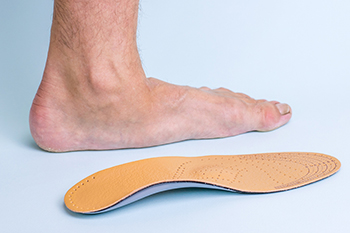
Having flat feet, or pes planus, is a common condition among adults. Flat feet, sometimes called fallen arches, can cause problems with the ankles and knees. In addition, they can have a negative effect on body alignment, which can increase the likelihood of injury while engaging in sports or other activities. Many people do not experience pain from having flat feet, while others may feel pain in the arch or ankle. The pain may be worse at night or after engaging in prolonged activity. The main problem with flat feet is that the arch cannot support the soft tissues in the foot, causing swelling and fatigue. Obesity is one of the main contributors to developing flat feet. Diabetes, rheumatoid arthritis, and aging are other common factors. A number of treatments for flat feet are available for people who have problems caused by flat feet. Among them are custom orthotics, which can be made by a podiatrist to address the specific problems of your feet. If you have pain or discomfort from flat feet, it is suggested that you make an appointment with a podiatrist.
Flatfoot is a condition many people suffer from. If you have flat feet, contact one of our podiatrists from Fox Valley Foot and Ankle Specialists. Our doctors will treat your foot and ankle needs.
What Are Flat Feet?
Flatfoot is a condition in which the arch of the foot is depressed and the sole of the foot is almost completely in contact with the ground. About 20-30% of the population generally has flat feet because their arches never formed during growth.
Conditions & Problems:
Having flat feet makes it difficult to run or walk because of the stress placed on the ankles.
Alignment – The general alignment of your legs can be disrupted, because the ankles move inward which can cause major discomfort.
Knees – If you have complications with your knees, flat feet can be a contributor to arthritis in that area.
Symptoms
- Pain around the heel or arch area
- Trouble standing on the tip toe
- Swelling around the inside of the ankle
- Flat look to one or both feet
- Having your shoes feel uneven when worn
Treatment
If you are experiencing pain and stress on the foot you may weaken the posterior tibial tendon, which runs around the inside of the ankle.
If you have any questions please feel free to contact our office located in Naperville, IL . We offer the newest diagnostic and treatment technologies for all your foot and ankle needs.
Why Are My Feet Swollen?
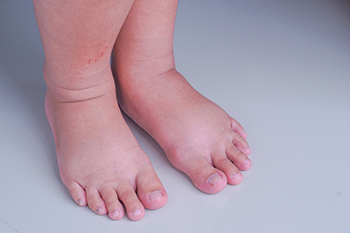
There are various reasons why people may experience swollen feet. Having high blood pressure is a common reason that feet can swell, and limiting salt intake and drinking plenty of water may help to reduce this. Research has shown that many women who are premenopausal develop swollen feet, possibly as a result of their body preparing to start the next phase of their life. Existing medical conditions may lead to having swollen feet, including diabetes, poor circulation, or heart disease. Integrating a gentle exercise and stretching routine may help to control swollen feet, in addition to losing extra weight, if applicable. People who stand for long periods of time during their work day may have swollen feet, and it can be helpful to wear shoes that fit correctly. The arthritic condition that is known as gout may cause the feet to swell, and relief may be found when eating habits are changed. If you have swollen feet, it is suggested that you consult with a podiatrist who can determine the cause and offer you correct treatment solutions.
Swollen feet can be a sign of an underlying condition. If you have any concerns, contact one of our podiatrists of Fox Valley Foot and Ankle Specialists. Our doctors can provide the care you need to keep you pain-free and on your feet.
Swollen feet are a common ailment among pregnant women and people who stand or sit for extended periods. Aging may increase the possibility of swollen feet and patients who are obese often notice when their feet are swelling too. There may be medical reasons why swollen feet occur:
- Phlebitis - A condition that causes the veins to become inflamed and can also cause leg pain.
- Liver disease - This may lead to low blood levels of albumin which is a protein. This can cause fluid in the blood to pass into the tissues and several areas of the body can become swollen.
- Heart failure - When the heart doesn’t pump properly the blood that is normally pumped back to the heart can pool in the veins of the legs causing swollen feet.
- Kidney disease - One of the main functions of the kidneys is releasing excess fluid in the body. This type of condition can make it difficult for the kidneys to function properly, and as a result the feet may become swollen.
- Deep-vein thrombosis (DVT)- This is a serious condition where blood clots form in the veins of the legs. They can block the return of blood from the legs to the heart which may cause the feet to swell. It is important to be treated by a podiatrist if this condition is present.
Swollen feet can also be caused by bone and tendon conditions, including fractures, arthritis, and tendinitis. Additionally, there may be skin and toenail conditions and an infection may cause the feet to swell. Patients who take medicine to treat high blood pressure may be prone to getting swollen feet.
Many patients elevate their feet to help relieve the swelling and this is generally a temporary remedy. When a podiatrist is consulted the reason behind the swelling can be uncovered and subsequently treated.
If you have any questions please feel free to contact our office located in Naperville, IL . We offer the newest diagnostic tools and technology to treat your foot and ankle needs.
What Type of Orthotic Do I Need?
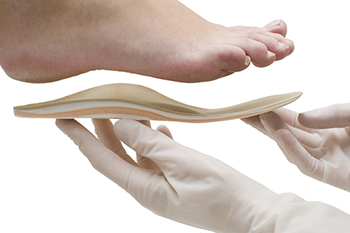
There are specific foot conditions that may benefit from wearing orthotics. These can include flat feet, high arches, and plantar fasciitis. Orthotics are defined as prescribed heel or shoe inserts that are made to treat foot conditions. They generally provide more support in shoes and are available in various shapes and sizes. Custom-made orthotics are known to fall into three categories. Hard materials such as plastic are used to make functional orthotics, and can be durable and long-lasting. They can help to offer support to the foot and improve ankle mobility. Accommodative custom orthotics are made of softer materials, and are generally well-cushioned. They are effective in reducing the stress of standing and walking, and may be chosen for diabetic patients. Orthotics made of both of these types of materials are referred to as semi-rigid. They can be used to treat patients who have arthritic or flat feet. If you have a foot condition that requires orthotics to be worn for maximum improvement, it is suggested that you consult with a podiatrist who can determine what the best type is for you and can create a custom orthotic to meet your foot's specific needs.
If you are having discomfort in your feet and would like to try orthotics, contact one of our podiatrists from Fox Valley Foot and Ankle Specialists. Our doctors can provide the care you need to keep you pain-free and on your feet.
What Are Orthotics?
Orthotics are inserts you can place into your shoes to help with a variety of foot problems such as flat feet or foot pain. Orthotics provide relief and comfort for minor foot and heel pain but can’t correct serious biomechanical problems in your feet.
Over-the-Counter Inserts
Orthotics come in a wide variety of over-the-counter inserts that are used to treat foot pain, heel pain, and minor problems. For example, arch supports can be inserted into your shoes to help correct overarched or flat feet, while gel insoles are often used because they provide comfort and relief from foot and heel pain by alleviating pressure.
Prescription Orthotics
If over-the-counter inserts don’t work for you or if you have a more severe foot concern, it is possible to have your podiatrist prescribe custom orthotics. These high-quality inserts are designed to treat problems such as abnormal motion, plantar fasciitis, and severe forms of heel pain. They can even be used to help patients suffering from diabetes by treating foot ulcers and painful calluses and are usually molded to your feet individually, which allows them to provide full support and comfort.
If you are experiencing minor to severe foot or heel pain, it’s recommended to speak with your podiatrist about the possibilities of using orthotics. A podiatrist can determine which type of orthotic is right for you and allow you to take the first steps towards being pain-free.
If you have any questions please contact our office located in Naperville, IL . We offer the newest diagnostic and treatment technologies for all your foot and ankle needs.
